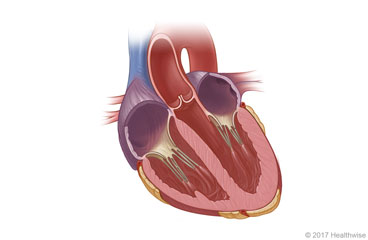
What is a transesophageal echocardiogram (TEE)?
A transesophageal echocardiogram is a test to help your doctor look at the inside of your heart. A small device called a transducer directs sound waves toward your heart. The sound waves make a picture of the heart's valves and chambers.
Your doctor may do this test to look for certain types of heart disease. Or it may be done to see how disease is affecting your heart.
You will be given medicine to make you sleepy and comfortable during the test.
The doctor puts a small, flexible tube into your throat and guides it to the esophagus. This is the tube that connects your mouth to your stomach. The doctor will ask you to swallow as the tube goes down.
The transducer is at the tip of the tube. It gets close to your heart to make clear pictures. The doctor will look at the ultrasound pictures on a screen.
You will not be able to eat or drink until the numbness from the throat spray wears off. Your throat may be sore for a few days after the test.
How do you prepare for the procedure?
Procedures can be stressful. This information will help you understand what you can expect. And it will help you safely prepare for your procedure.
Preparing for the procedure
-
Follow your doctor's instructions exactly about when to stop eating and drinking before the test. This may be about 8 hours.
-
Be sure to tell your doctor about any problems you have with your stomach or esophagus.
-
Be sure you have someone to take you home. Anesthesia and pain medicine will make it unsafe for you to drive or get home on your own.
-
Understand exactly what procedure is planned, along with the risks, benefits, and other options.
-
Tell your doctor ALL the medicines, vitamins, supplements, and herbal remedies you take. Some may increase the risk of problems during your procedure. Your doctor will tell you if you should stop taking any of them before the procedure and how soon to do it.
-
If you take a medicine that prevents blood clots, your doctor may tell you to stop taking it before your procedure. Or your doctor may tell you to keep taking it. (These medicines include aspirin and other blood thinners.) Make sure that you understand exactly what your doctor wants you to do.
-
Make sure your doctor and the hospital have a copy of your advance directive. If you don't have one, you may want to prepare one. It lets others know your health care wishes. It's a good thing to have before any type of surgery or procedure.
What happens on the day of the procedure?
-
Follow the instructions exactly about when to stop eating and drinking. If you don't, your procedure may be canceled. If your doctor told you to take your medicines on the day of the procedure, take them with only a sip of water.
-
Take a bath or shower before you come in for your procedure. Do not apply lotions, perfumes, deodorants, or nail polish.
-
Take off all jewelry and piercings. And take out contact lenses, if you wear them.
-
If you have dentures or dental prostheses, you may need to remove them before the test.
At the hospital or surgery center
-
Bring a picture ID.
-
You will be kept comfortable and safe by your anesthesia provider. You may get medicine that relaxes you or puts you in a light sleep.
-
You will get some medicine sprayed in your throat. This will numb your throat to prevent you from gagging when the transducer is moved into your esophagus.
-
You will lie on your left side on an exam table. You may get a mouth guard to protect your teeth.
-
The procedure may take about 30 to 60 minutes. During that time, the tube may be in your throat for 10 to 20 minutes.
When should you call your doctor?
- You have questions or concerns.
- You don't understand how to prepare for your procedure.
- You become ill before the procedure (such as fever, flu, or a cold).
- You need to reschedule or have changed your mind about having the procedure.
Where can you learn more?
Go to http://www.healthwise.net/patientEd
Enter K504 in the search box to learn more about "Transesophageal Echocardiogram: Before Your Procedure".
Current as of: July 31, 2024
Author: Ignite Healthwise, LLC Staff
Clinical Review Board
All Healthwise education is reviewed by a team that includes physicians, nurses, advanced practitioners, registered dieticians, and other healthcare professionals.

